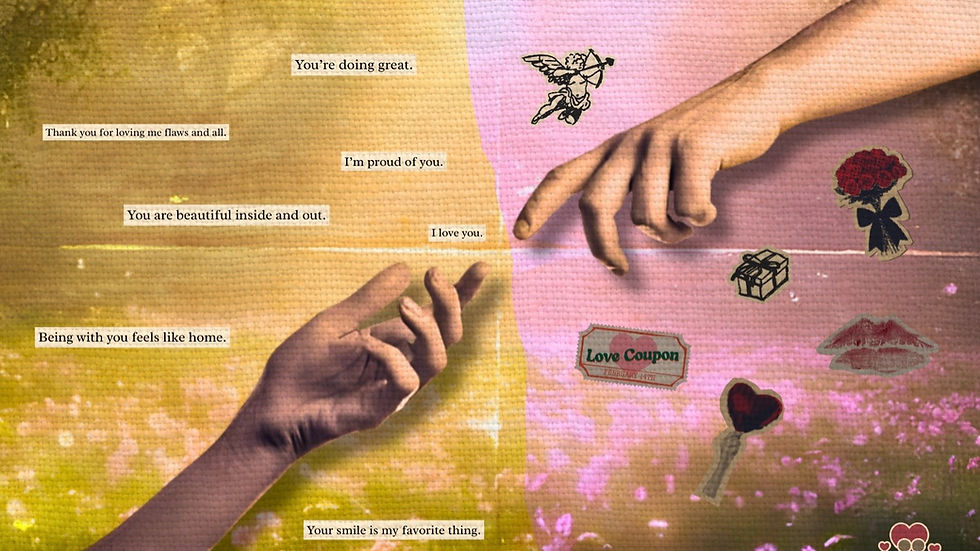LIFESTYLE AND CULTURE | Tahan Na: An Act of Love for the Anti Hero
- The Communicator
- Feb 9, 2023
- 3 min read
"Sometimes being offered tenderness feels like the very proof that you've been ruined."
—On Earth, We’re Briefly Gorgeous, Ocean Vuong.

Love is said to have played a major role in the ancient world. Like every structure, the origin of theories of love was a gradual process in the ancient Greco-Roman world. It started with Empedocles, who proposed that the world was created out of fire, water, air, and earth with love and strife as the two divine forces; with Aristophanes narrating that a person used to be two people glued together until Zeus split them in two halves; and with Homer’s Iliad and Odyssey, which used love as the central part of the story. Love was defined and redefined in context and time.
In the contemporary translation of love, specifically storge or familial love, in a high-culture context like the Philippines, it is seen through the assumption of responsibilities. Children who were raised in a Filipino household learned the non-verbal cues of familial communication: a stare can mean stop; phrases like ‘kain po’ exemplify courtesy, no-answers like ‘ikaw bahala,’ and ‘siguro,’ wear different attire but share the same meaning. Filipino culture embeds respect and submission. Everything is laid out, you just need to pick up the things the elders never explicitly tell you.
As meanings change, Filipinos of the newer generation critique the outdated customs of a typical Filipino family. And it was clear in popular media when Star Cinema’s 2013 film, Four Sisters and a Wedding, hit the cinemas. Each of the actresses made their mark on the movie, but the one character who flocked to the internet memes and was the most quoted is Bobbie Salazar, played by Bea Alonzo. Bobbie is a ‘corporate communications manager’ based in New York. Unapologetic, detached, and very un-Filipino bida (i.e., with anti-hero qualities), she shocked the audience when she finally forfeited her cold demeanor and let her mask fall.
During the climax, Bobbie’s act of love is seen when she stripped away the pretense and let the repressed emotions come pouring out of her—letting the words appear as oral proof that this pain is real, and that it has reduced and comforted me as a person. As an audience, Bobbie is portraying our buried desire to make our love and pain known and acknowledged. The scene is a massive demonstration of wanting and craving to be seen. It’s what makes Bobbie’s confession so dear to us. In a society where we have to implicitly understand social rules and norms, being seen as a person and not the role we have to play is rare.
Like Bobbie, who equipped herself with poised air and utter rationality—the one who appears educated, proper, and calm, who seems to have everything under control, feels human and vulnerable the moment she allows herself to break down. It isn’t romantic love that liberates her; it’s her love for her family and her desire to be understood. For all of her knowledge and experiences, all the rationality that went into her head for all her sacrifices, the one that frees her is the acceptance of her pain. Her happy ending is the love that she has always known and cherished.
To find references to love in the medium of the language that we know and to learn them through theoretical or dramatic illustration of what and how it feels like is sometimes freeing. Sometimes people understand stories because they reflect their own; love is better understood through scouring personal experiences. And as it’s been told before and as life has depicted, love is beyond understanding; it consumes us more than we consume it.
And so consider this: maybe, finally, after desperately finding and longing for it in strange places, love will be found inside your childhood home, passing amongst the voices of the people that you know, looming behind every stare, grin, and laughter, waiting. Love may be inside your mother’s hands, offering a half-eaten clementine, looking at you, smiling vividly against the backdrop of your relentless siblings, warmth radiating off her, and you feel it embracing you, as though to reconnect.
Love may be the one you had as a child, but you lost it until it found you again, and it grasps your hand and clings to your scent. Love may be the one that simmers within you amidst the festive noise—an unspoken plea, an obvious inevitable. At the rowdy dinner table of your childhood home, you will feel a semblance of being filled, but first, as a condition, you need to allow yourself to be seen.
Article: Cyril de la Cruz
Graphics: Yuko Shimomura




Comments